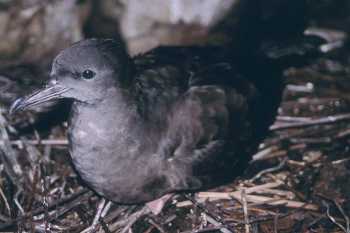Stephen Totterman (Empire Vale, New South Wales, Australia) has published in the New Zealand journal Notornis on recording calls of burrow-breeding Wedge-tailed Shearwaters Puffinus pacificus.
The paper’s abstract follows:
“Calls and playback-response behaviour of breeding wedge-tailed shearwaters (Puffinus pacificus) were studied at Muttonbird Island, Coffs Harbour, New South Wales, Australia. Burrow calls were recorded from 45 females and 60 males. Male calls averaged higher in fundamental frequency and longer in note lengths than female calls, although ranges overlapped. Playback experiments demonstrated sexual recognition, with incubating females mostly responding to female playbacks. Males responded to both female and male calls. Ratios of between- to within-subject variation suggested that individual vocal signatures could be encoded in timing and some frequency parameters. Playback experiments demonstrated a “dear enemy” effect, where shearwaters in burrows were more responsive to stranger rather than neighbour calls. Wedge-tailed shearwater calls are informative and further studies are encouraged for other southern hemisphere breeding shearwaters.”

Wedge-tailed Shearwater, photograph by Alan Burger
Click here for a related paper by Stephen.
Reference:
Totterman, S.L. 2015. Sexual and individual differences in wedge-tailed shearwater (Puffinus pacificus) burrow calls and vocal recognition. Notornis 61: 121-130.
John Cooper, ACAP Information Officer, 07 August 2015

 English
English  Français
Français  Español
Español